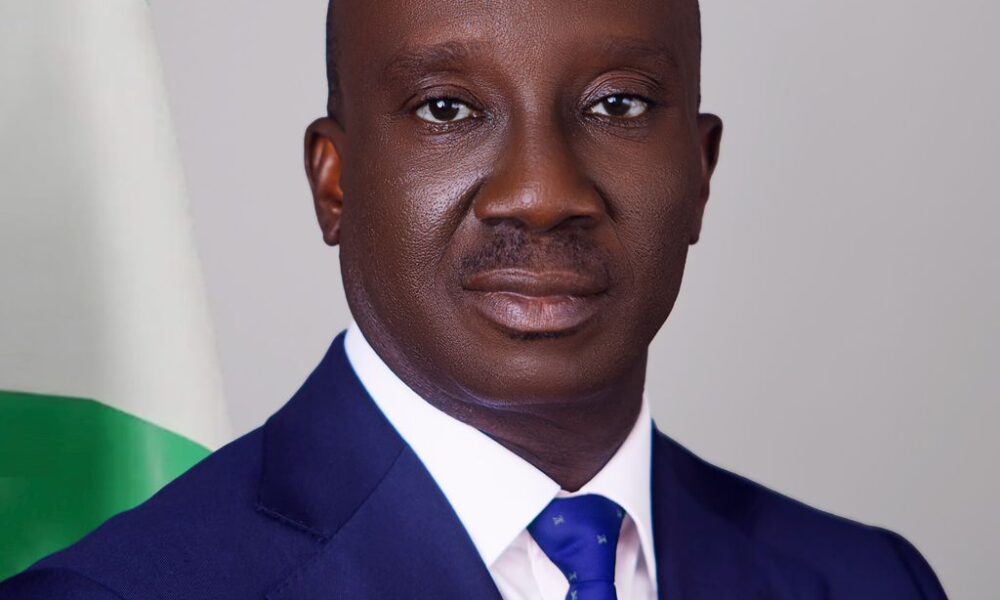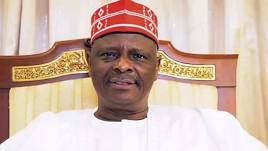By Fred Itua
As I set out to pen this piece on this serene Sunday afternoon, my mind is drawn to the profound epistle of Apostle Paul to the Corinthians in 1 Corinthians 1:27-29: “But God hath chosen the foolish things of the world to confound the wise; and God hath chosen the weak things of the world to confound the things which are mighty; and base things of the world, and things which are despised, hath God chosen, yea, and things which are not, to bring to nought things that are: That no flesh should glory in his presence.”
Hallelujah!

I have chosen to begin this way because it resonates deeply with my assessment of Governor Monday Okpebholo’s leadership over the past two months.
When Senator Monday Okpebholo stepped into the political ring, many underestimated him. He wasn’t the loudest voice in the room, nor the most flamboyant. In a political landscape where the ability to raise dust often overshadows the capacity to lay foundations, Okpebholo’s calm and collected demeanor was dismissed as a weakness. But, as Apostle Paul aptly put it, God has a way of using the “foolish” things of the world to confound the wise. And indeed, Governor Okpebholo has confounded his critics with actions that speak louder than the hollow rhetoric of his predecessor.
To truly appreciate the transformation taking place in Edo State, one must first understand where we’re coming from. For eight long years, governance was more about optics than outcomes. The previous administration, under Governor Godwin Obaseki, was a masterclass in what the locals have dubbed “audio governance.” Projects were announced with great fanfare, but their execution remained a mirage. MoUs were signed and celebrated, only to gather dust in forgotten drawers. Roads that were critical to economic and social well-being were left to rot, with billboards proclaiming, “Please bear with us; this is a federal road,” as if to absolve the state of any responsibility.
Governor Okpebholo has flipped the script. He didn’t start his administration with loud declarations or endless ribbon-cutting ceremonies. Instead, he started with work—real, tangible work.
In just two months, Governor Okpebholo has demonstrated that governance is about delivering results, not excuses. The Benin-Auchi Road by Obadan Junction, long neglected, has received the needed attention. The failed portions of the Benin-Abuja Road in Ekpoma, which seemed destined to remain a nightmare for travelers, are now under repair. Roads that were mere campaign promises in the past, like Upper Ekenwan Road, are nearing completion.
Even the Aduwawa-Upper Mission Junction, a project that felt like a distant dream, is now coming to life. And let’s not forget the Temboga-Uteh Road, which now wears the Governor’s signature of progress.
One resident put it succinctly: “In just two months, this man has done more than others did in eight years. He doesn’t make noise; he makes things happen.”
Beyond roads, Governor Okpebholo’s administration is tackling the long-neglected healthcare sector. The construction of a modern health center in Udomi, Irua, is a testament to his commitment. The 2025 budget allocates N63.9 billion to healthcare and an additional N1.8 billion for a health insurance scheme, ensuring that no Edo citizen is left behind.
One of the most commendable moves of Governor Okpebholo’s administration has been his decisive action to sanitize Edo’s markets. By placing a ban on market unions, which had long been accused of oppressive and exploitative practices, the governor has brought relief to traders and consumers alike. These unions had been driving up the prices of food and commodities through arbitrary levies and monopolistic control, leaving ordinary Edo citizens to bear the brunt.
In his words, “Markets should be places of commerce and community, not oppression. We cannot allow a few individuals to profit at the expense of the majority.”
Since the ban, market prices have begun to stabilize, and traders have expressed gratitude for the governor’s intervention.
Edo State has not been immune to the scourge of insecurity, particularly the alarming rise in cult-related killings that claimed over 100 lives in 2024. Governor Okpebholo has tackled this issue head-on, adopting a consultative and inclusive approach. Through interagency consultations and his robust security meetings, he has fostered collaboration among law enforcement agencies and local communities.
This proactive engagement has led to a significant de-escalation of tensions and a peaceful resolution to many conflicts. As one community leader observed, “For the first time, we feel heard. The governor is not just issuing orders; he’s listening and acting.”
Another area where Governor Okpebholo has demonstrated his commitment to justice is in addressing the contentious issue of land grabbing. Under the previous administration, many communities and individuals saw their lands forcefully taken, their properties destroyed, and their voices silenced.
Governor Okpebholo has taken a firm stance, declaring that such lands will be restored to their rightful owners, provided they can present proof of ownership. This policy has brought renewed hope to many Edo citizens who had all but given up on ever reclaiming their ancestral lands.
“The government is here to serve the people, not to oppress them,” the governor stated. “We will right the wrongs of the past and ensure justice prevails.”
Governor Okpebholo’s 2025 budget, aptly titled the “Budget of Renewed Hope for a Rising Edo,” is a roadmap to sustainable development. With 63% of the N604 billion budget earmarked for capital expenditure, it’s clear where his focus lies.
* Road Development: N162 billion
* Education: N48 billion
* Health: N63.9 billion
* Agriculture: N75 billion
This is not just a budget; it is a statement of intent. It reflects the governor’s five-point agenda—security, infrastructure, healthcare, food sufficiency, and education—augmented by a renewed focus on agriculture.
Governor Okpebholo’s approach to governance can be likened to a diligent farmer. While others scatter seeds carelessly, hoping for a quick harvest, he tills the soil, plants with precision, and nurtures the crops. The results are already visible, and the harvest promises to be bountiful.
In reforming local government administration, the governor has brought discipline and transparency to a system that was previously plagued by inefficiency. His bold steps are setting a new standard for accountability and service delivery.
Governor Monday Okpebholo is proving that leadership is not about noise but results. He is confounding the critics and inspiring the citizens. As Apostle Paul wrote, God uses the weak and despised to bring about great things, and in Edo State, this truth is playing out before our very eyes.
Edo is rising, not on the wings of empty promises, but on the back of a governor who understands that actions speak louder than words. Indeed, Governor Okpebholo has become the farmer who sows in silence and reaps in abundance—a leader who delivers hope, one project at a time.
Fred Itua is the Chief Press Secretary to Edo State Governor



